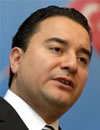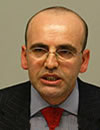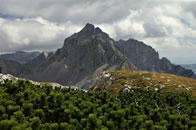Islamic Calvinist as president? - Regatta in the Balkans - jobs with ESI
Dear friends of ESI,
Following Turkey's July elections everything is set for the incoming Erdogan government and Turkey's next president to renew reform efforts directed at EU membership. Before elections Turkey's government set itself a target to meet EU standards for accession by 2014. Prime Minister Erdogan vowed in his first speech after AKP's election victory that "with the strong support of our nation expressed in these elections we will work towards realizing our Republic's objective of EU membership".
At the same time all realistic dates for EU accession of Western Balkan countries (except Croatia) are slipping further away. The Kosovo diplomatic quagmire deepens. Relations between the EU and Serbia could easily deteriorate as a result, despite the efforts of Serbian reformers such as Milica Delevic. While the powers of the military in Turkey are set to be reduced further, Bosnia-Herzegovina welcomed yet another High Representative with unlimited powers (supposedly required as long as Kosovo's status remains disputed). While Turkey has launched a debate on a new, more democratic constitution the constitutional reform process in Bosnia-Herzegovina remains stuck.
Will future historians point to the summer of 2007 as the moment when it first became clear that Turkey would join the European Union before either Serbia or Bosnia-Herzegovina?
 |
 |
 |
 |
 |
|
Ali Babacan |
Mehmet Simsek |
Güldal Mumcu |
Milica Delevic |
Elizabeth Roberts' Montenegro |
Islamic Calvinist as Turkish president
Turkey's likely next president, Abdullah Gül, is familiar to ESI readers, as he plays a central role in our 2005 report on Islamic Calvinists which explored the social, economic and cultural changes and the role of Islam in his home province of Kayseri.
Conventional wisdoms overthrown
For political forces trying to capitalize on anti-EU sentiments in Turkey the results of the July elections were a surprising setback. The nationalist and EU-skeptical MHP did enter the Turkish parliament, but with a smaller share of the popular vote (14 percent) than in 1999 (18 percent). The no less nationalist Youth Party lost. So did the Islamist Felicity Party. The Democratic Party did not enter parliament despite an election manifesto meant to capitalize on frustration with the EU: "we do not embrace a negotiation process that is open ended and in which the result is not guaranteed … We categorically reject the impositions that are being made on Turkey that are not a part of the Copenhagen Criteria, that threaten Turkey's independence, national sovereignty, unity and safety of borders, and that are only being brought up by the EU because of AKP's submissiveness." The Republican People's Party (CHP), whose leader Deniz Baykal repeatedly warned that "nationalism is this society's main glue … nobody should toy with the nation's honor, and nobody should show disrespect to this nation's basic values", also tried unsuccessfully to benefit from EU-skepticism.
The victorious AKP was the only political force which campaigned on a platform of accelerating the process of EU integration. Already in April Foreign Minister Abdullah Gül and Chief EU negotiator Ali Babacan presented a 412-page "Program for Harmonization with EU Legislation" including a self-imposed deadline to complete the harmonization with the EU Acquis by 2011.
Its election manifesto was clear:
"The program for harmonization with the EU acquis which we released on 17 April 2007 includes details about the calender and responsible institutions for the reforms that will take place between 2007-2013. This document includes 188 laws and 576 regulations and is a concrete indication of our decisiveness towards Turkey's obtaining the highest standards irrespective of the political problems of the EU membership process".
This message was repeated throughout the election campaign. As Ali Babacan told an energy conference in Istanbul on the eve of elections Turkey would become "a Third World country" unless it applied EU standards of democracy and the rule of law. One of the many new faces of the AKP, economist Mehmet Simsek, affirmed that "the accession process for full EU membership will continue to be the anchor for Turkey's economic and political reforms".
The pre-election conventional wisdom on Turkey was that embracing the EU had become a risky political strategy. One Turkish commentator reflected this mood in April 2007: "I have recently been bombarded with emails. Most of the emails are about how the country is being divided, the dirty games forces from abroad are playing, and how the country's land is being sold out. The main enemy in the letters is the EU."
This conventional wisdom has to be questioned now that the elections are behind us. It clearly paid off for the AKP to restate its commitment to EU integration. It helped the government to set ambitious targets itself. And it turned out that there were a lot less votes in EU-skepticism than a large part of the Turkish political class had believed. As Erdal Saglam wrote on 24 July in Hurriyet: "There are some joint lessons for all parties from the results of these elections. The primary one is about the EU target. … governments need to be pushed to adopt all European values and not only those that are in their interests."
Women in Turkish Politics
There are now 50 women in the new Turkish parliament (30 from the victorious AKP), a historical record. There are two female deputy speakers, another first. According to tables kept by the Inter-Parliamentary Union (IPU) Turkey moves from 122nd to 100th position. This is still low, but Turkey has for the first time overtaken other European countries (Albania, Montenegro and Ukraine) and narrowly missed overtaking an EU member (Malta, 99th in the IPA ranking).
Turkish women organizations vow to continue to campaign for better representation of women in politics. Will Turkey (9.1 percent women in parliament) overtake EU-members such as Hungary (10.4 percent), Slovenia (12.2 percent) or Greece (13 percent) before 2014?
Women in Parliaments in South East Europe (IPU data August 2007)
|
%
|
|||
| Europe Nordic Countries |
41.6
|
||
| Macedonia |
28.3
|
candidate | |
| Bulgaria |
22.1
|
member | |
| Croatia |
21.7
|
candidate | |
| Serbia |
20.4
|
potential candidate | |
| Europe OSCE members without Nordic countries |
17.9
|
||
| Bosnia-Herzegovina |
14.3
|
potential candidate | |
| Greece |
13.0
|
member | |
| Slovenia |
12.2
|
member | |
| Romania |
11.2
|
member | |
| Turkey |
9.1
|
candidate | |
| Montenegro |
8.6
|
potential candidate | |
| Albania |
7.1
|
potential candidate |
Jobs with ESI: Tbilisi, Yerevan, Baku, Timisoara, Thessaloniki and Belgrade/Podgorica
As we are expanding our work in the Caucasus we are looking for local research analysts who have substantial English writing experience and are already based in Tbilisi, Yerevan and Baku.
We are also looking for researchers to support our activities in the Balkans. We are looking for one analyst based in Timisoara who can support ESI for a few months (either full time or part-time) as we produce a portrait of the Timisoara region. We are looking for one analyst fluent in Greek to support ESI research in Thessaloniki and/or Athens and is already based there. We are also looking for one person with organisational skills to support an ESI documentary film project in Serbia and Montenegro in the autumn.
If you want to join our team please check out our website and contact Sandra Bien-Aime.
Best regards,
![]()
Gerald Knaus

Gerald Knaus
- ESI job openings Balkan (Timisoara, Greece)
- ESI in the media (July-August): The Economist, Wall Street Journal, BBC, El Mundo, Liberazione, Prospect (UK), Falter (Austria), Al Jazeera, Austrian public radio, Austrian national television, The Guardian, Der Standard
- Basic facts about Turkish women
- NEW: Elizabeth Roberts' Montenegro
